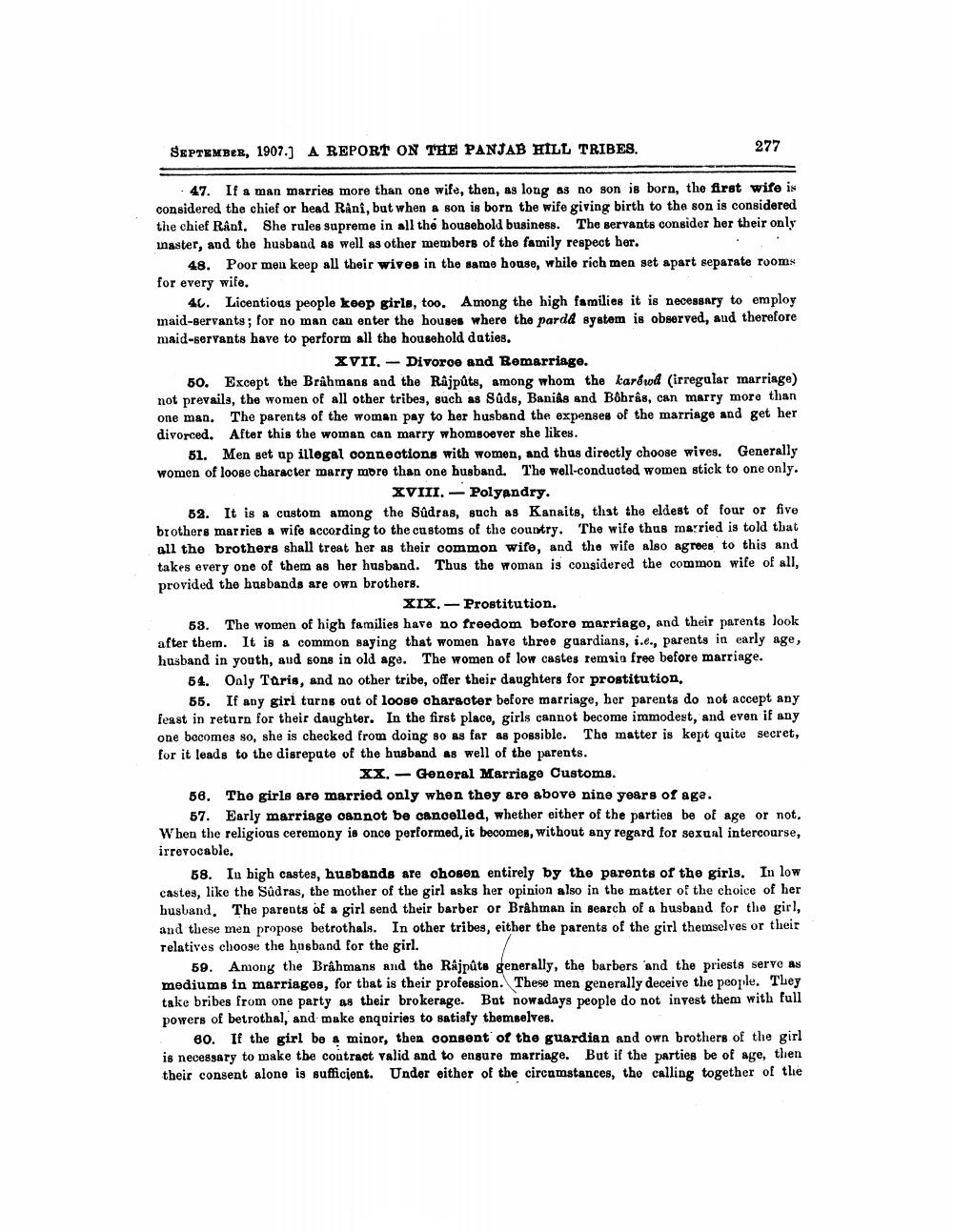________________
SEPTEMBER, 1907.) A REPORT ON THE PANJAB HILL TRIBES.
277
47. If a man marries more than one wife, then, as long as no son is born, the first wife is considered the chief or head Rani, but when a son is born the wife giving birth to the son is considered the chief Rânt. She rules supreme in all the household business. The servants consider her their only inaster, and the husband as well as other members of the family respect her.
48. Poor men keep all their wives in the same house, while rich men set apart separate rooms for every wife.
46. Licentious people keep girls, too. Among the high families it is necessary to employ maid-servants; for no man can enter the houses where the pard& system is observed, and therefore maid-servants have to perform all the household daties.
XVII. - Divoroe and Bomarriage. 50. Except the Brâhmans and the Rajpûts, among whom the karard (irregular marriage) not prevails, the women of all other tribes, such as Süds, Banias and Bêbras, can marry more than one man. The parents of the woman pay to her husband the expenses of the marriage and get her divorced. After this the woman can marry whomsoever she likes.
51. Men set up illegal connections with women, and thus directly choose wives. Generally women of loose character marry more than one husband. The well-conducted women stick to one only.
XVIII. - Polyandry. 52. It is a custom among the Sudras, such as Kanaits, that the eldest of four or five brothers marries a wife according to the customs of the country. The wife thus married is told that all the brothers shall treat her as their common wife, and the wife also agrees to this and takes every one of them as her husband. Thus the woman is considered the common wife of all, provided the husbands are own brothers.
XIX. - Prostitution. 53. The women of high families have no freedom before marriage, and their parents look after them. It is a common saying that women have three guardians, i.e., parents in early age, husband in youth, and sons in old age. The women of low castes remain free before marriage.
54. Only Taris, and no other tribe, offer their daughters for prostitution,
55. If any girl turns out of loose character before marriage, her parents do not accept any feast in return for their daughter. In the first place, girls cannot become immodest, and even if any one becomes so, she is checked from doing so as far as possible. The matter is kept quite secret, for it leads to the disrepute of the husband as well of the parents.
XX. - General Marriage Customs. 56. The girls are married only when they are above nine years of age.
57. Early marriage cannot be cancelled, whether either of the parties be of age or not. When the religious ceremony is once performed, it becomes, without any regard for sexual intercourse, irrevocable.
58. In high castes, husbands are chosen entirely by the parents of the girls. In low castes, like the Sadras, the mother of the girl asks her opinion also in the matter of the choice of her husband. The parents of a girl send their barber or Brahman in search of a husband for the girl, and these men propose betrothals. In other tribes, either the parents of the girl themselves or their relatives choose the husband for the girl.
59. Among the Brahmans and the Rajpûts generally, the barbers and the priests serve as mediums in marriages, for that is their profession. These men generally deceive the people. They take bribes from one party as their brokerage. But nowadays people do not invest them with full powers of betrothal, and make enquiries to satisfy themselves.
60. If the girl bo & minor, then consent of the guardian and own brothers of the girl is necessary to make the contract valid and to ensure marriage. But if the parties be of age, then their consent alone is sufficient. Under either of the circumstances, the calling together of the




